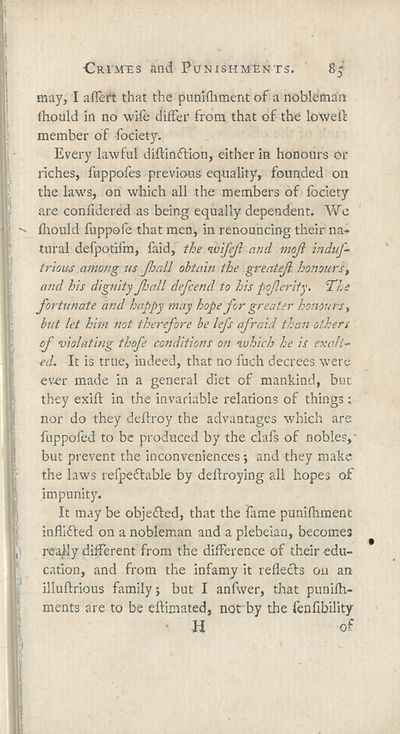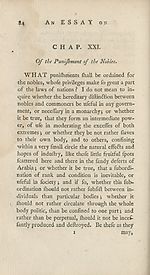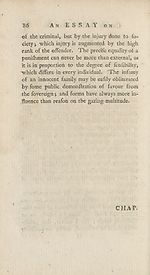Download files
Complete book:
Individual page:
Thumbnail gallery: Grid view | List view

Crimes and Punishments. 85
may, I aflert that the pnnifliment of a nobleman
(hould in no wife differ from that of the loweft
member of fociety.
Every lawful diftinfrion, either in honours or
riches, fuppofes previous equality, founded on
the laws, on which all the members of fociety
are confidered as being equally dependent. We
fhould fuppofe that men, in renouncing their na¬
tural defpotifm, faid, the ivifejl and mojl induf-
trious among us Jhall obtain the greatejl honours,
and his dignity Jhall defcend to his pojlerity. The
fortunate and happy may hope for greater honours,
but let him not therefore be lefs afraid than others
of violating thofe conditions on which he is exalt¬
ed. It is true, indeed, that no fuch decrees were
ever made in a general diet of mankind, but
they exift in the invariable relations of things;
nor do they deftroy the advantages which are
fuppofed to be produced by the clafs of nobles,
but prevent the inconveniences •, and they make
the laws refpeftable by deftroying all hopes of
impunity.
It may be objected, that the fame punifhment
inflifted on a nobleman and a plebeian, becomes
really different from the difference of their edu¬
cation, and from the infamy it reflects 011 an
illuftrious family; but I anfwer, that punifh-
ments are to be eftimated, not by the fenfibility
H of
may, I aflert that the pnnifliment of a nobleman
(hould in no wife differ from that of the loweft
member of fociety.
Every lawful diftinfrion, either in honours or
riches, fuppofes previous equality, founded on
the laws, on which all the members of fociety
are confidered as being equally dependent. We
fhould fuppofe that men, in renouncing their na¬
tural defpotifm, faid, the ivifejl and mojl induf-
trious among us Jhall obtain the greatejl honours,
and his dignity Jhall defcend to his pojlerity. The
fortunate and happy may hope for greater honours,
but let him not therefore be lefs afraid than others
of violating thofe conditions on which he is exalt¬
ed. It is true, indeed, that no fuch decrees were
ever made in a general diet of mankind, but
they exift in the invariable relations of things;
nor do they deftroy the advantages which are
fuppofed to be produced by the clafs of nobles,
but prevent the inconveniences •, and they make
the laws refpeftable by deftroying all hopes of
impunity.
It may be objected, that the fame punifhment
inflifted on a nobleman and a plebeian, becomes
really different from the difference of their edu¬
cation, and from the infamy it reflects 011 an
illuftrious family; but I anfwer, that punifh-
ments are to be eftimated, not by the fenfibility
H of
Set display mode to:
![]() Universal Viewer |
Universal Viewer | ![]() Mirador |
Large image | Transcription
Mirador |
Large image | Transcription
| Antiquarian books of Scotland > Crime & punishment > Essay on crimes and punishments > (87) |
|---|
| Permanent URL | https://digital.nls.uk/129849071 |
|---|
| Description | Thousands of printed books from the Antiquarian Books of Scotland collection which dates from 1641 to the 1980s. The collection consists of 14,800 books which were published in Scotland or have a Scottish connection, e.g. through the author, printer or owner. Subjects covered include sport, education, diseases, adventure, occupations, Jacobites, politics and religion. Among the 29 languages represented are English, Gaelic, Italian, French, Russian and Swedish. |
|---|

